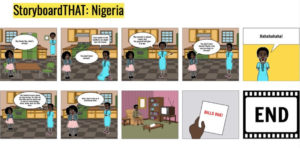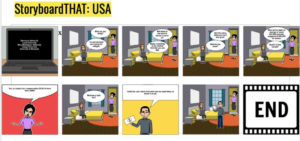Amanda Israel, Erin Stephey, Jessica Merrick
Proposal
Gender roles are “the role or behavior learned by a person as appropriate to their gender, determined by the prevailing cultural norms” (Lumen Learning). We see it all the time in the United States, whether its women not being paid the same as men, or people just not taking women seriously overall when it comes to them being in STEM degrees (science, technology, engineering and math). As we continue further research on this topic, we know that gender is a conflicting topic within our society as well as outside of the United States.
For example, in Nigeria, women are “expected to plan office parties because it’s a ‘woman’s job’…..As a woman, I am expected to make my own meals…”(Samiha Nettikkara). Women are considered and expected to be “nurturing, caring, social, emotional” (Treleaven 1). They were also considered to stay at home and become the caretakers . On the other hand, men were considered “aggressive, instinctual, private, promiscuous”, while also expected to be the breadwinners of the family (Treleaven 1).
As we see in Ngozi Adichie’s Americanah, gender role conflicts play a major theme, as it continues to be a common issue throughout the book. Whether it be showing Obinze’s constant power struggle overall compared to Ifemelu, or just the lack of independence Aunty Uju has.
Another factor that we see with regards to gender roles is the financial differences. According to Onward Healthcare, male nurses “make an average of about $84,000 annually vs. $80,000 for women”. It is said that even in the same career, males get paid more than females.
For our group project, we are specifically going to use the scene from chapter 5 of Chimamanda Ngozi Adichie’s Americanah. In this scene, we can see gender roles from when Ifemelu was shocked when she found out that Aunty Uju didn’t have her own money because the General refused to let her handle the money.
For the visual aspect of this project, we are doing a storyboard comic. We thought this would be a great way to show the chosen scene from Americanah because we thought it would be a fun way to show visual representation of the gender/generation roles from the Nigerian aspect.
Script
2 columns of comic- 1 for Nigeria, 1 for US.
Nigeria-
Page 92
Characters- Aunty Uju, Ifemelu, The General
Aunty Uju- concerned about money; asks General about money; feels helpless; Dependent
The General-Prideful/Stubborn; refuses to ask/take money from others who wish to help; more Independent
Ifemelu- Concerned about Aunty Uju
Scene 1
INT. KITCHEN – DAY
Ifemelu
“Hey Aunty Uju, what’s wrong?”
Aunty Uju
(with a sad expression)
“I just spoke to the landlord. He says we could lose the house.”
Ifemelu
“ You don’t have money?”
Aunty Uju
“ My account is almost empty, but The General will give it to me.”
Ifemelu
“ You don’t have money? Ahn-ahn, Aunty, how can you not have money?”
Aunty Uju laughs
Aunty Uju
“The general never gives me big money. He pays all the bills and he wants me to ask for everything I need. Some men are like that.”
Ifemelu has a shocked expression
Aunty Uju
“Ifem, don’t look as if somebody died”. (she laughs)
INT. LIVING ROOM – DAY
The general sits in the living room, looking at a slip of paper that says “Bills Due!”
END
USA
Family of 3- Husband, Wife, Daughter
Daughter-High School; Senior; looking for colleges;Husband and Wife work similar jobs
(Husband:Jeff, Wife: Catherine, Daughter: Rachel)
INT. RACHEL’S BEDROOM – DAY
Scene 1
Meant to depict what it’s like in US
Rachel looking for a college as she finishes her senior year of high school; at her desk; shows laptop screen of colleges.
(Catherine enters)
“What are you doing?”
Rachel
“ I’m just stressed out looking for colleges”.
Catherine
“Well what do you want to pursue a career in?”
Rachel
“Maybe something in the medical field like you and Dad.”
Catherine
“Well the salary difference isn’t that great.”
Rachel
“What do you mean?”
Catherine
“Male nurses make an average of about $84,000 annually, compared to $80,000 for women.”
Rachel
“Really? Is that normal?”
Catherine
“Yea, in a typical job, a woman makes 80 cents of every man’s dollar.”
Rachel
(with a shocked expression on face)
“Well how is that fair?”
Jeff walks in holding paycheck
Jeff
“Catherine, your check from work was too small today, so dinner’s on me.”
END
Storyboard THAT


Annotated Bibliography
BBC Trending. “What it means to be female in Nigeria”. BBC News, 1 Jul, 2015.
https://www.bbc.com/news/blogs-trending-33239356
The article is “What it means to be female in Nigeria”. BBC News interviewed Nigerian writer Chimamanda Ngozi Adichie. Adichie is a feminist who believes in spreading the word about gender equality, especially dealing with women, had many women use “a hashtag on Twitter to share their experiences of everyday gender discrimination” (BBC). The intended audience is for those who can relate to a similar story of their own about when they were discriminated against. A secondary audience could be those curious about gender roles in Nigeria, specifically females, even though it is based off personal experiences.
The main claim that is taken away from this is the inequality of gender roles between men and women. The article is bias because it only shows tweets about the gender inequality that women face, which is obvious since the focal point in the article is about gender roles of women in Nigeria. Not only that, it’s only about the women in Nigeria and not the general population. This is a weakness that can be noticed in the article. However, some of the tweets are straightforward and help the viewers get an idea of the role of women. It does support and is relevant to the project because the tweets show the gender discrimination and role women of Nigeria.
Long-Crowell, Erin. “Social Roles: Definition and Types of Social Roles”. Study.com, 2018.
https://study.com/academy/lesson/social-roles-definition-and-types-of-social-roles.html
The source used here is a video that gives a quick lecture on “Social Roles: Definition and Types of Social Roles”. The speaker of the lecture is Erin Long-Crowell. Long-Crowell has studied Psychology and has her M.Ed. The lecture is a quick discussion of what a social role is and how we as men and women contribute to a certain role. Based off the lecture, a social role “defines a set of behaviors that are expected of someone who holds a particular status” (Long-Crowell). Women, mothers especially, are meant to stay at home and be nurturing caregivers. Men, especially fathers, are said to be the breadwinners and bring in the money.
The lecture claims a social role and the different types. The audience intended for this lecture is for students or people in general to learn about social roles. This video supports and is relevant to the project because it gives an overall idea on what should be expected of men and women in social roles. Social roles do have an influence on gender roles.
“Gender Roles in the U.S.” Lumen Learning. Retrieved from,
https://courses.lumenlearning.com/cochise-sociology-os/chapter/gender-roles-in-the-u-s/
This article helped us with the final project by giving us some ideas of scenarios where the gender roles are different. This website goes into thorough detail about the variety of gender roles not only in United States, yet in different countries. This website uses theories (gender and social role theory, and socialization) to help explain how controversial this topic is. This helped spark the idea of how we can compare the United States gender roles to Nigeria’s.
Brownstein, Ronald. (9 October, 2018). “There is a huge and growing divide on gender roles in the US”. Retrieved from
https://www.cnn.com/2018/10/09/politics/us-divide-gender-roles-kavanaugh-women-college/index.html
This source helped us towards our final by helping us give some common ideas of gender roles specifically in the United States. It talks about the “Me Too” Movement, and overall continued to support our point in which we are trying to show how men are supposed to be dominant and strong, while the female is continued to be perceived as weak minded. It continues to talk about how men can basically get away with a lot of questionable issues, yet won’t be questioned in society.
Treleaven, Christina. “Gender, Generation, and Jobs: Differences in Gender Role Ideologies by Age and Occupation”, 2015.
https://ir.lib.uwo.ca/cgi/viewcontent.cgi?article=1001&context=sociology_masrp
This research paper is titled “Gender, Generation, and Jobs: Differences in Gender Role Ideologies by Age and Occupation” by Christina Treleaven. The author of this research paper has a bias towards the argument that there is gender inequality in the workplace. She states that gender inequality is still an issue today and women are getting paid less than men, which is in part due to the gender norms. Her major claim states that it is important to understand the structural factors that our opinions towards gender and gender roles come from, which is important when looking at gender equality.
This source is very relevant to our project because it is giving evidence of gender inequalities around the world that women are facing. This evidence is backed by very reputable sources including whitehouse.gov, text about Segregation in American workplaces by race, ethnicity, and sex, etc.
Searls, D. (2019). Do Male Nurses Earn More? Survey Says Yes. Retrieved April 29, 2019, from https://www.onwardhealthcare.com/nursing-resources/do-male-nurses-earn-more-survey-says-yes/
This article from Onward Healthcare explains that there is a difference between salary for female and male registered nurses. The author of this article gives multiple statistics that were found by the University of California San Francisco. This is a known university and the research conducted seems to be legit information. One weakness to the data given is that no locations are given for the data. By stating that the average salary is lower for women RNs than male RNs, that is beneficial information to know; however, does the salary gap differ depending on the state that these RNs are working in?
The major claim that Searls makes is that while male RNs make more than female RNs when looking at salaries, both males and females make the same average of about $37 an hour. The information given from the conducted research is very beneficial to our project because it gives specific data regarding the pay of male and female RNs, which backs up the claim that there is in fact gender inequality in the workplace.